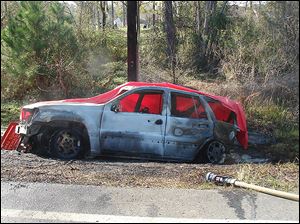
In reverse, Chrysler OKs recall of 1.5M Jeeps
Automaker moving voluntarily after initially refusing
6/19/2013
A 4-year-old boy was burned and died in Bainbridge, Ga., in 2012, when this Jeep Grand Cherokee caught fire after it was struck from the rear by a Dodge Dakota.
Maybe it was concern over consumer perception, or maybe it was the ease of the fix. Whatever it was, Chrysler Group LLC reversed course on Tuesday and said it would recall voluntarily 1.56 million out of 2.7 million Jeeps that federal regulators said pose a fire hazard in rear-end collisions.
The action covers Jeep Grand Cherokees from 1993 through 2004 and Jeep Libertys from 2002 through 2007. Last month, the National Highway Traffic Safety Administration asked Chrysler to recall those vehicles, saying an investigation had found at least 51 people had been killed in fiery rear-impact crashes involving them.
Chrysler responded by saying the vehicles were safe, and it did not intend to issue a recall.
The deal reached on Tuesday between the NHTSA and Chrysler ends the unusual two-week-long standoff, though Chrysler’s position that its vehicles are not flawed and are safe to drive hasn’t changed.
“Chrysler Group’s analysis of the data confirms that these vehicles are not defective and are among the safest in the peer group,” the company said Tuesday. “Nonetheless, Chrysler Group recognizes that this matter has raised concerns for its customers and wants to take further steps, in coordination with NHTSA, to provide additional measures to supplement the safety of its vehicles.”
Specifically, Chrysler dealers will add a trailer hitch to vehicles that don’t have a factory-installed hitch or a similarly approved Mopar-brand hitch.
NHTSA said the affected vehicles were at risk of tank ruptures and fire because of the location of their gas tank, which are behind the rear axle and below the bumper. The Jeeps were among the last models from any manufacturer that hadn’t moved tanks in front of the rear axle to better protect them.
The simple, bolt-on fix of a trailer hitch adds an extra layer of protection behind the tanks.
Chrysler moved the fuel tank ahead of the rear axle when it redesigned the Grand Cherokee in 2005 and did the same with Liberty, which was built in Toledo, starting in 2008.
Tuesday, NHTSA said in a statement that it’s pleased with Chrysler’s decision. The agency plans to keep investigating the issue as it reviews recall documentation from Chrysler.
Chrysler will send out letters notifying owners of the recall, but it’s not clear yet when dealers will begin performing the work.
Alec Gutierrez, senior analyst at Kelley Blue Book, said Chrysler officials likely realized they were risking the company’s reputation with some consumers by trying to fight the recall, even if they do believe there’s no flaw in the vehicle design.
“I think what they’ve done is they’ve compromised,” Mr. Gutierrez said. “They’ve come up with an amenable solution that will work for the brand and consumers as well.”
Though the spat between Chrysler and NHTSA was unusual and drew a lot of attention, now that Chrysler has acquiesced, analysts don’t expect it to have any lasting damage on the company’s reputation. In recent years, recalls have not generally had much effect on how consumers view brands or on used car prices in recalled models.
Chrysler didn’t say how much it believes it will spend to inspect and service those vehicles, and the automaker is unlikely to do so.
Mr. Gutierrez estimated the fix would cost Chrysler about $100 a vehicle. But it’s impossible to know how many owners will honor the recall.
Mike Hehl, the service manager at Yark Chrysler Dodge Jeep Ram in Sylvania Township, said a lot of people do bring in their vehicles when recalls go out, especially when it’s a substantial problem.
“If it’s something safety related, most customers will make an appointment for it,” Mr. Hehl said.
However, in spite of all the news generated by NHTSA’s request and Chrysler’s initial refusal, Mr. Hehl said he wasn’t aware of anyone calling the dealership to ask about the safety of their vehicle.
Dealers hadn’t received details yet on the recall on Tuesday.
NHTSA began investigating the Jeeps three years ago at the request of the Center for Auto Safety, a Washington advocacy group. Clarence Ditlow, the center’s director, said the trailer hitch remedy should be tested by NHTSA before the repairs are made. Mr. Ditlow said he’s cautiously optimistic that the solution will make the Jeeps safer.
In a statement released June 4, Chrysler said its review of nearly 30 years of data shows a low number of rear-impact crashes involving fire or a fuel leak in the affected Jeeps. “The rate is similar to comparable vehicles produced and sold during the time in question,” the company said.
The last time an automaker defied an NHTSA recall request was early in 2011, when Ford said that calling back 1.2 million pickup trucks for defective air bags wasn’t justified. Ford later agreed to the recall after NHTSA threatened to hold a rare public hearing on the issue.
Information from the Associated Press was used in this report.
Contact Tyrel Linkhorn at:
tlinkhorn@theblade.com
or 419-724-6134.